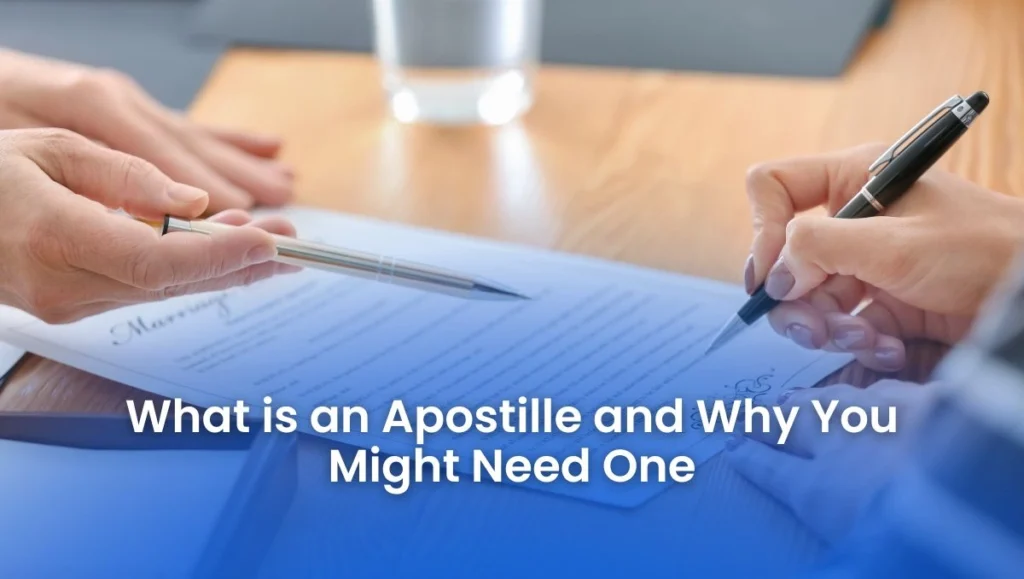Planning to study, work, or handle legal matters abroad? You might need an important certification called an apostille for your trip.
The apostille works as an international stamp of approval that confirms your public documents are genuine. The 1961 Hague Convention Treaty created this system so member countries could recognize each other’s documents. The process is straightforward. You’ll spend between $20 to $200 based on where you live, what type of document you need certified & how soon you need it. Public records like birth certificates, marriage licenses, divorce decrees, and educational documents all qualify for apostille certification.
Let us guide you through the basics of apostilles. You’ll learn their purpose, which documents qualify, and how to get one for your paperwork.
What is an Apostille and How Does It Work?

An apostille works as an official certificate that proves the origin of public documents used internationally. The 1961 Hague Convention Treaty created this system that replaced the complex multi-step certification needed earlier to verify documents across borders.
How does an apostille function? The apostille system verifies three vital elements:
- The signature’s authenticity on the document
- The signer’s authority to sign
- Any seal or stamp’s identity on the document
Note that an apostille only proves the document’s source and authenticity, not its contents.
Apostille vs. Authentication: Key Differences.
| Feature | Apostille | Authentication |
| Used for | Countries that are members of the 1961 Hague Convention | Countries not party to the Hague Convention |
| Process complexity | Simpler one-step process | More complex, multi-step process |
| Processing time | Typically 1-2 weeks | Can take up to 12-15 weeks |
| Recognition | Valid in all member countries | Valid only in the specific country where legalized |
The destination country decides which certificate you need. You’ll need an apostille if the country belongs to the Hague Convention. If not, you must get an authentication certificate.
The document type determines which authority should issue the certificate. State-issued documents like birth certificates need apostilles from that state’s Secretary of State. Federal documents require apostilles from the U.S. Department of State.
Before preparing documents to use internationally, check if your destination country participates in the Hague Convention. Choosing between apostille and authentication incorrectly could lead to document rejection and delay your international transactions significantly.
Remember that notaries cannot issue apostilles – only designated government authorities have this power.
Which Documents Can Be Apostilled?
Documents that qualify for apostille certification span multiple categories. These certifications cover broad groups of records that need international recognition.
Common Documents Eligible for Apostille Certification
| Document Category | Examples |
| Vital Records | Birth certificates, marriage licenses, death certificates |
| Business Documents | Articles of incorporation, certificates of good standing, bylaws |
| Educational Records | Diplomas, transcripts, degrees and school records |
| Legal Documents | Adoption paperwork, affidavits, powers of attorney and wills |
| Property Records | Deeds of assignment, bills of sale, proof of ownership |
| Identity Documents | Passports, national identification certificates |
Your document’s destination country determines the type of certificate you need. Countries that participated in the 1961 Hague Convention Treaty accept apostille certificates, while others require authentication certificates.
Different documents follow distinct authorization paths. The U.S. Department of State processes federal documents signed by U.S. federal officials or consular officers. State-issued documents need apostilles from their originating state’s Secretary of State.
Note that apostilles only confirm the authenticity of signatures, signer capacity, and any seals or stamps—not the document’s content. This requirement explains why officials must sign or notarize documents before apostille certification.
Many people ask about notarization versus apostille certification. Notarization confirms signatures within the United States, while apostille certification enables document recognition in foreign countries. Most documents need notarization before getting an apostille.
Note that apostilles serve international purposes only—documents used within the United States don’t need them.
How to Get an Apostille for Your Document

After deciding your document needs an apostille, you’ll need to work through the application process. The authentication process follows a well-laid-out path that changes slightly based on your document type and where you live.
Document Preparation
Your document must be:
- An original or certified copy with original seals and signatures
- Dated and issued by the right authority
- Professionally translated if the destination country requires it
Submission Options and Costs
| Submission Method | Processing Time | Typical Costs | Special Notes |
| 5-10 business days | $10-$20 per document | Include self-addressed return envelope | |
| In-Person | Same day to 7 days | $10-$20 per document | Appointments may be required |
| Drop-off | 5-7 business days | $10-$20 per document | Available at limited locations |
| Expedited | 24-48 hours | $20-$50 per document | Additional fees apply |
For Oregon, the state fee per apostille is $10. State-issued documents like birth certificates or marriage licenses need to go through that state’s Secretary of State office. Federal documents must go through the U.S. Department of State.
Payment Methods
These offices accept several payment options:
- Personal checks or money orders (payable to the specific agency)
- Credit/debit cards (when submitting in-person or online)
- Cash (only accepted for in-person submissions)
Processing times don’t include mailing time. You can get expedited services at extra cost if you need them quickly. The U.S. Department of State offers appointments for urgent cases, especially if you need to travel within two weeks or have family emergencies abroad.
New applicants should verify their state’s specific document requirements. Small issues like incorrect notarization can lead to rejections and delays.
Conclusion
Getting an apostille is vital if you work with international documents. The process looks complex at first glance, but document authentication becomes quick and simple when you follow the right steps.
| Key Takeaways | Action Points |
| Document Eligibility | Check if your document qualifies for apostille |
| Country Requirements | Verify the destination country’s Hague Convention status |
| Processing Options | Choose between standard or expedited service |
| Cost Considerations | Budget $20-$200 depending on document type and urgency |
Note that proper preparation determines successful document authentication. Each country has its own specific requirements. You should check these requirements before you start the process to save time and avoid rejection. Standard apostille certification takes 5-10 business days, so early preparation becomes vital for time-sensitive documents.
Many states provide accelerated services with extra fees if you need quick authentication. The best way to avoid delays and extra costs is to ensure your documents meet all requirements before submission, whatever your timeline may be.
Ready to Apostille Your Documents?
Don’t let paperwork delays hold you back. At Oregon Apostille Hub, we make the authentication process fast, secure, and stress-free. Whether you need standard or expedited service, our experts ensure your documents meet all requirements—saving you time, money, and frustration.
Start your apostille process today — contact us now or request a quote online!

